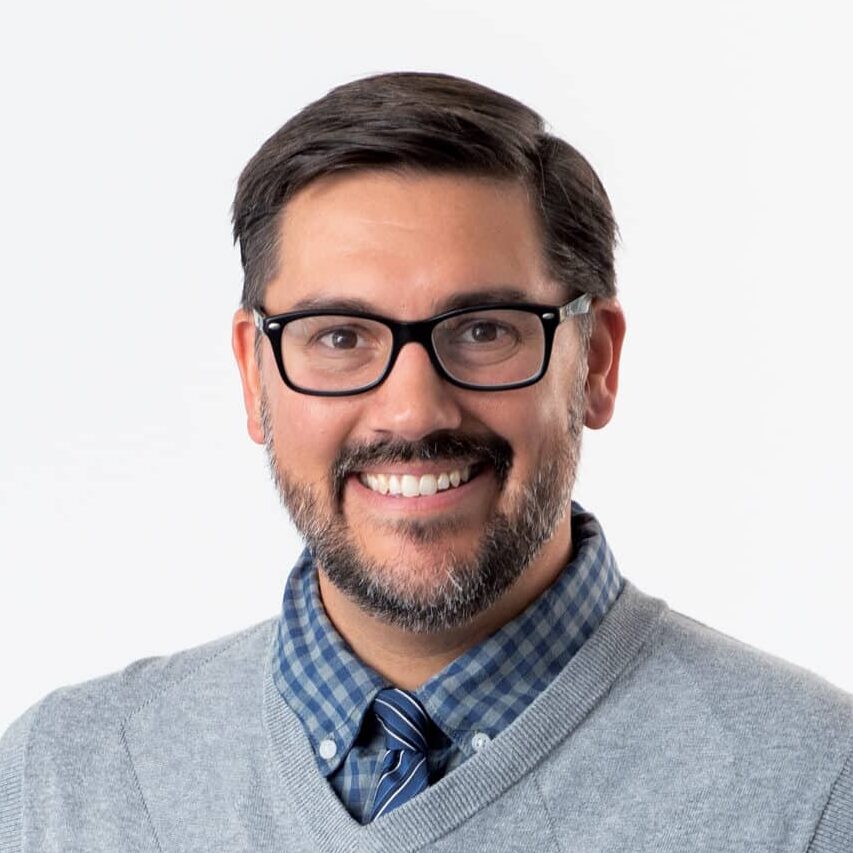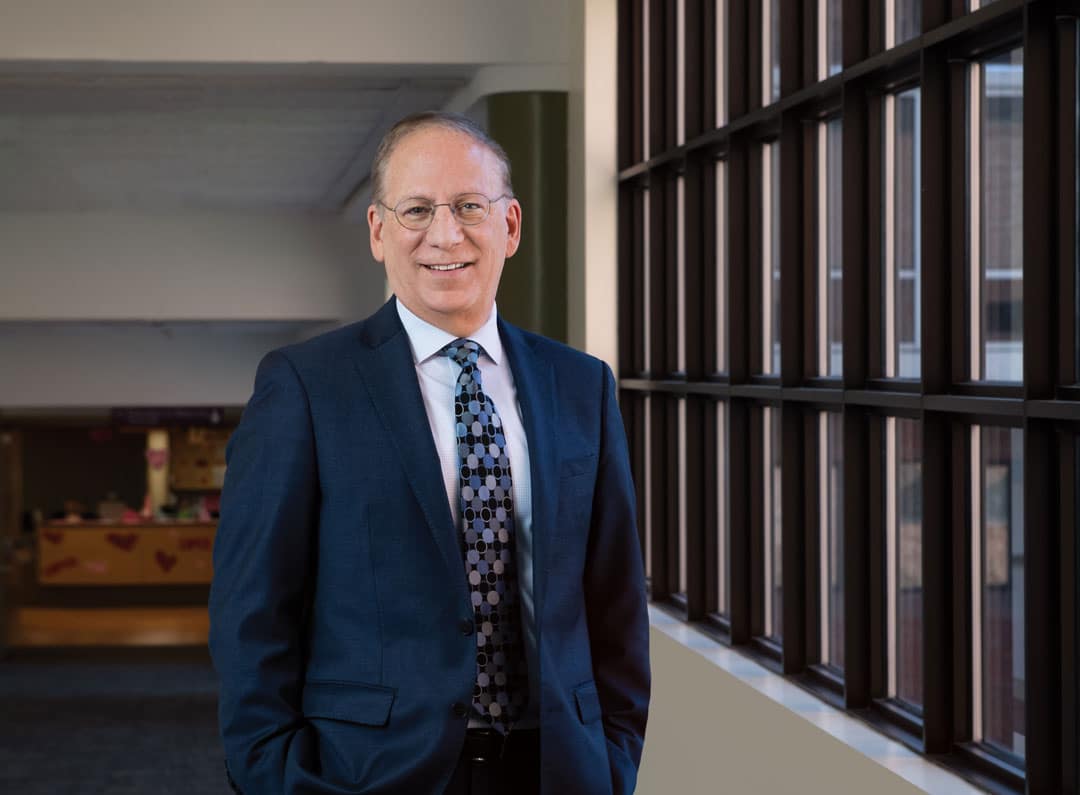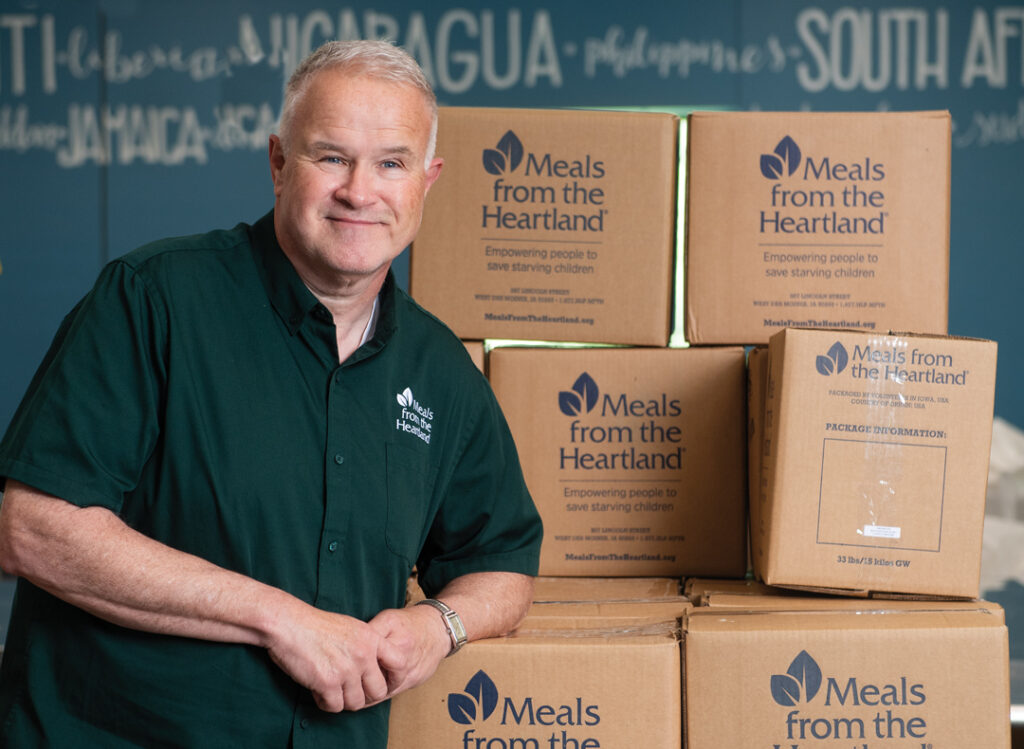A Closer Look: Jon Rozenfeld
Market president, UnityPoint Health – Des Moines

Jon Rozenfeld arrived in Des Moines on Jan. 8 to a brown, dry landscape to begin his new role as UnityPoint Health’s market president. By the next day, the scenery looked a little different – 10 inches of snow and heavy wind.
“I came in that weekend to beautiful, snowless Des Moines, and two days later, you know the rest,” he told the Business Record.
A lifelong Midwesterner and North Side Chicago native, Rozenfeld was not deterred by the midwinter blizzard.
On Dec. 7, UnityPoint announced the 30-year health care administrator had been selected to succeed David Stark, who was transitioning to a government, external affairs and philanthropy executive post at UnityPoint after leading the health system’s Des Moines market since June 2018.
The urge for Rozenfeld to pursue a career in health care started as a child with nightly dinner table conversations with his parents. They were clinicians. Rozenfeld said his father was a pediatrician and pediatric neurologist, and his mother was a psychiatric social worker who worked in school systems to provide support for kids who “needed a little extra help.”
“Early on, they instilled in me [the idea] to pick a career that would do good … to have meaningful work to contribute to the communities that you work in. And so while I knew early on I didn’t want to go on the clinical side, I was much more geared toward the business operations strategy side.”
Rozenfeld spent the first half of his career in medical organizations in the Chicago market. He started as an administrator in academic medical facilities, including the Johns Hopkins University School of Medicine in Baltimore and Loyola University Medical Center in Maywood, Ill.
“They’re big, complex organizations and very physician-oriented,” Rozenfeld said. “It was an opportunity to get exposure to every single aspect of hospital operations. You had finance, you had strategy, you had operations, you had nursing. It really was a really good entry into hospital leadership and hospital management.”
As UnityPoint’s market president in Des Mones, Rozenfeld is responsible for the medical system’s five area hospitals: Iowa Methodist Medical Center, Iowa Lutheran Hospital, Methodist West Hospital, Blank Children’s Hospital and Grinnell Regional Regional Medical Center.
UnityPoint’s Des Moines market also includes the mental health services program, UnityPoint Heath—Eyerly Ball, and the John Stoddard Cancer Center.
According to data provided by UnityPoint, the medical system and its clinics have 10,223 team members and 416 volunteers.
The Business Record recently caught up with Rozenfeld to discuss his path to medicine and the trends he thinks could define the industry in the next decade.
Responses have been lightly edited and condensed for clarity.
You mentioned your parents were your inspiration for getting into the medical industry. What about how they carried themselves in the profession inspired you and drove you?
We started [this interview] talking about the dinner table. That’s where as a kid, you learn a lot about what your parents do and what’s important to them, and it really was around dinner conversation you could tell that their passion [was] for helping people. They didn’t breach HIPPA (the Health Insurance Portability and Accountability Act), even though that was prior to HIPPA. But they did talk about the people that they worked with and cared for, and how they felt that they were making a difference in the lives of these children and the families of these kids. What really resonated with me as I looked for what I wanted to do [was] make sure that I chose something that I was equally passionate about [and] felt that I was making a difference in the work that we’re doing. The other thing that really stuck with me early on is they also were very generous in terms of volunteering in different organizations. Back then, all I knew was how many nights they were gone. But then as I grew up, I understood that they weren’t home every night because they were voluntary board members of different organizations, not-for-profits. So it wasn’t just about the work that they personally did; it was much more about other ways of giving back to the community. So those are the things that really have stuck with me.
What key moments brought you to lead UnityPoint here in Des Moines? How did you end up in this role?
There were a couple of things. I spent a lot of my career in faith-based medicine, and while that’s not overly important, what is [was] that they were very mission- and values-driven organizations. They’re serving a purpose for the community. And as I started looking at UnityPoint, while they’re not faith-based, they are very mission- and values-driven. So for me, that was a great connection point. If you look at the values of this organization, [they are] very aligned and consistent with my own values. It goes back to enjoyment, fulfillment of your role, and things of that nature. That was a big piece for me. Yes, you’re part of the community, you’re not for profit, you’re there to provide support to a community. But it’s always important to know what are those important things to the organization, knowing that living their mission and values every day was very important to me. The other thing that I enjoyed about or as I learned about UnityPoint, I’ve spent the majority of my career in the Midwest. I was in the Chicago market for many years. I was in Madison, Wis., for a number of years. I was in southern Illinois, so I really like the Midwest. I like the Midwest friendliness and the value proposition in the Midwest. So the opportunity to stay in the Midwest was very appealing to me as well.
How would you describe your leadership style?
I have to go back, starting in academic medicine. It was really about partnering with our physician colleagues. I use the word collaborative a lot. I do believe that through collaborative efforts, you’re going to make better, more informed decisions – the things that are important to organizations. I would say [I’m] very transparent. I’m a firm believer that people should know the things that we’re working on together and our performance as it relates to those goals and metrics. And finally, results-oriented. We need to make sure that we’re achieving the things that we’ve set out to do. We hold each other accountable to achieve those goals for the success and sustainability of the organizations you work with.
What’s the next big thing for UnityPoint Health and UnityPoint Health – Des Moines?
I would say access to our services, so making sure that we have the right services in the right location at the right times for our community and our patients. With COVID, you saw televisits becoming popular. I believe we need to make sure that we are staying on top of what are those trends and how do we continue to do that. As we look at growing, we are building the new site and Waukee, which should be opened this spring. We are building a new, beautiful Eyerly Ball facility by our Lutheran Campus. It’s about looking at what services are needed and how do we provide them at the right place for the community and our patients.
There’s been a lot of discussion about worker shortages in the medical field. What’s UnityPoint’s greatest employment need and how do you fill that?
Like most industries [or] businesses, workforce shortages is probably one of our top challenges today. For me, it comes down to two things, it comes down to recruitment and retention. From the recruitment side, our biggest selling point is talking about our mission and values. Like myself, the reason I’m here, that’s a big part of it. And I think as we tell our story, that is going to bring people here. It’s about creating an environment where people want to work. We need to be competitive with salaries and then provide a work environment where people will find fulfillment [and] find a family-type of environment. And the longevity of our folks here is pretty incredible. So we need to recruit additional folks. We have training programs. We’re trying to train the next generation of health care providers. That is a great way to bring people into an organization. If you train them, the likelihood is they’re going to stay, assuming you’re providing a good education experience and a good environment. The other piece is retention, making sure that you’re retaining people. Again, competitive salaries and benefits, but really, what’s the environment? I would say there isn’t one area, [but] I would say nursing shortages is our biggest challenge. We’re trying to look at our nursing model, which includes [registered nurses]. We’re looking at bringing back [licensed practical nurses] into the acute care setting. Our patient care techs, we’re looking at medical assistants joining that. So, how do we make sure we have the right number of people to provide safe, high-quality care to our patients? But then there’s a whole host of others: pharmacy, radiology, laboratory. There are shortages across the board. I think through creating a strong culture and training the next level of health care providers, we’re going to be in a good position.
What does that training look like? Is there an educational component? Some health systems are looking at beginning recruitment as early as the high school level. What’s the model?
The preferred model is partnering with those in the community that already have a platform to do that. We are partnering with many of the community colleges and other programs that are out there, making sure that they have clinical rotations. We are part of them through the clinical rotation. We have done other things where we’ve looked at programs internally. We do have residency programs that are based out of Methodist. We do have a program for [middle school students]. So bring them in early on, get them exposed to it and hopefully light that spark about health care and the work that people do. We started early, hoping that through their education, they decide for a career in health care.
What technology, new practice or administrative strategy do you see could change the medical industry in the next decade?
I would say a topic of interest certainly is [artificial intelligence], and how can AI help in health care. Most health care organizations, including us, are very much in the infancy of looking at AI. Obviously, with HIPAA, [the introduction of AI makes] inpatient privacy become a little more challenging. Plus, you’re dealing with people’s lives. So you want to make sure that you’re using [AI] smartly and wisely. I would say, though, like you’re seeing nationally, with time, AI will be a part of health care. I can’t today say what that would look like. Just know that we have to be very cautious on how we use AI in health care, but I would say that’s probably the biggest. The other is a lot of people out there trying to enter health care by providing a certain level of service. While our competition historically has been competing health care systems, our competition now includes drugstores that are providing urgent care, Walmart, all these other companies that are getting into wellness and health care. Our definition of competitor has changed, so we need to decide how do we either partner with folks or compete in that area as well. … Free-standing emergency centers are becoming popular in high-growth areas that may be 20 to 30 minutes away from a full-service hospital. I think there is a role for free-standing [emergency departments] in the health care model as well.
What’s one thing outside of work that gives you joy and fulfillment?
My family, spending as much time with them as I can. We also have two dogs, which I didn’t share earlier. So now that our kids are out of the house, our new kids are our dogs. When I’m not here, just being outdoors, enjoying our new community and getting to know that. The piece that we really didn’t touch upon is the community component of my job. And that is a big piece. I mentioned I started in academic medicine. One of the reasons I left academic medicine and went to what I would call large, community-based teaching hospitals was the opportunity to be much more involved in the communities that they serve. In Madison, I was at a 100-year-old facility, meaning they’ve been in the community. Getting involved in community boards, just community efforts, we are sponsors. And as one of the larger employers in town, people look to us to be visible, be active and support important initiatives for the organization. That is something that I personally enjoy. My predecessor, David Stark, who has stayed within UnityPoint and someone with whom I continue to work, is a great example of someone who is visible in the community. And I strive to with my time in Des Moines get to be involved in the community as well.
Favorite book or publication?
I don’t have a favorite book. The last things I’ve been reading are like “Pickleball for Dummies.” I’ve been trying to pick up on kind of the whole scoring thing and some of the nuances that are different from tennis. That’s what I’ve been reading at night when I get home. … In terms of publications, I like the Wall Street Journal, the Harvard Business Review, things that tell me what’s going on in the world and, specifically, how I can be a better leader, what’s happening in health care, and things of that nature.
At a glance
Hometown: Chicago’s North Side
Career highlights: Former CEO of Vista Health System in Waukegan, Ill., from November 2021 to July 2023; consultant and interim president and CEO at Hospital Sisters Health System, St. John’s Hospital, in Springfield, Ill., from January 2020 to November 2021; president of SSM Health St. Mary’s Hospital – Madison in Madison, Wis., from May 2015 to December 2019; chief operating officer at AMITA Health in Arlington Heights, Ill., from September 2012 to 2015; associate vice president – health care services at Loyola Medicine in Maywood, Ill., from January 1999 to January 2006; various administrator roles at the Johns Hopkins University School of Medicine in Baltimore from July 1990 to January 1996
Hobbies/activities: An “avid” tennis player and “learning more about pickleball”
Family: Wife, Jill (who is a pediatric occupational therapist), and two daughters, Jordan and Sydney
Education: Master of Business Administration in Health/Health care from the Wharton School of the University of Pennsylvania; Bachelor’s in biological basis of behavior from the University of Pennsylvania
Currently reading: “Pickleball for Dummies,” Wall Street Journal and the Harvard Business Review

Mike Mendenhall
Mike Mendenhall is associate editor at Business Record. He covers economic development, government policy and law.










